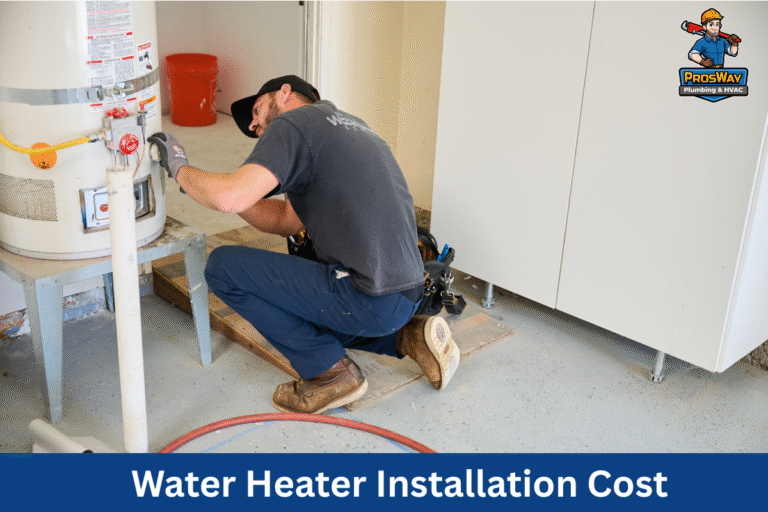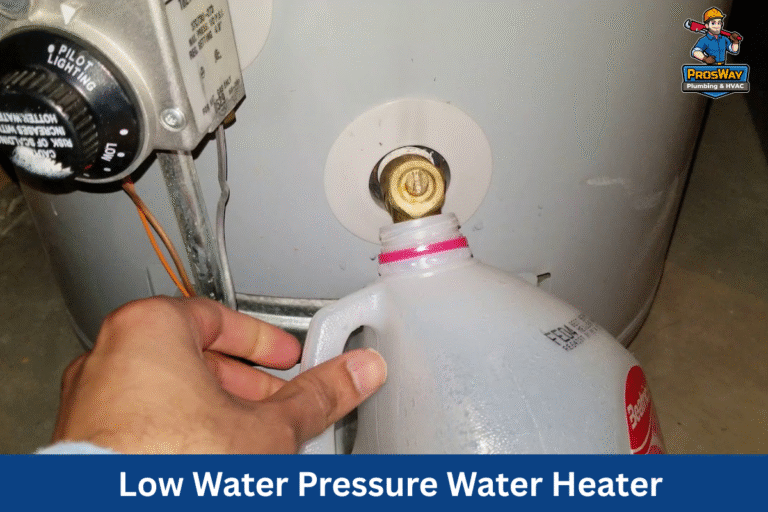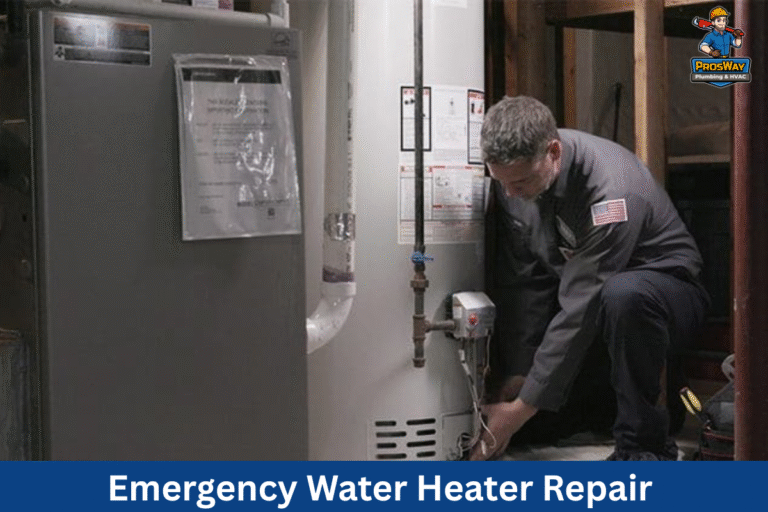A clogged drain can turn into a major headache, slowing down your daily routine and leading to expensive plumbing repairs if left untreated. Whether it’s a kitchen sink that won’t drain, a slow bathtub, or a backed-up toilet, acting fast can save you from bigger plumbing issues. This guide will help you fix a clogged drain quickly at home, recognize the signs of a clogged drain, use home remedies to clear blockages, and understand when to call a professional plumber. At ProsWay Plumbing & HVAC, we specialize in fast, effective clogged drain services to help homeowners easily tackle drainage issues.
Key Takeaways
- Identify early signs like slow drainage and gurgling sounds to prevent bigger issues.
- Use natural remedies like baking soda, vinegar, and boiling water for minor clogs.
- Try simple tools like a plunger or drain snake before calling a plumber.
- Prevent future clogs with regular drain cleaning and proper waste disposal.
- Call a professional for recurring or severe blockages to avoid costly repairs.
What Are the Signs of a Clogged Drain?

Before attempting any fix, it’s important to know what you’re dealing with. Some clogs happen due to everyday buildup like hair, soap, and grease, while others may be caused by deeper plumbing issues, like tree roots or pipe damage.
Identifying the problem early can help you decide whether it’s a simple DIY fix or something that requires expert help.
How Can You Check for a Drain Blockage?
The first step in diagnosing a clogged drain is to check for any visible obstructions. Hair, food scraps, or small objects might be blocking the flow of water.
If you see a blockage, try removing it with gloves, tweezers, or a small drain-cleaning tool. In kitchen sinks, grease buildup is common and may require flushing with hot water to dissolve.
Check for Slower Drainage in Other Rooms
If only one drain is slow, the clog is likely in that specific pipe. However, if multiple fixtures such as sinks, tubs, and toilets are draining slowly, the issue could be in your main sewer line.
A blocked sewer line can cause widespread drainage problems and may require professional drain cleaning before sewage backs up into your home.
Why Do Drains Make Gurgling or Bubbling Sounds?
Gurgling or bubbling noises coming from your sink, bathtub, or toilet indicate trapped air in the pipes.
This often happens when water struggles to pass through a blockage, creating air pockets that escape through the drain.
If these noises persist even after trying home remedies, it could mean there’s a bigger plumbing issue, such as a collapsed pipe or a venting problem.
Look for Signs of Water Damage Nearby
Standing water, damp cabinets, or water stains on walls and ceilings could indicate a clog is causing water to back up inside your pipes.
If left untreated, water damage can lead to mold growth and costly structural repairs. If you notice these signs, contact a plumber for a leak inspection before the problem worsens.
What Are the Best Ways to Unclog a Drain at Home?
If the clog isn’t too severe, you can try some simple, safe household remedies before calling a professional. These methods are effective and better for your plumbing system than harsh chemical cleaners.
Follow these practices to fix a clogged drain quickly at home:
Use Baking Soda and Vinegar for Natural Drain Cleaning
A mix of baking soda and vinegar can break down grease, soap scum, and debris that may be clogging your pipes. This method is also great for regular maintenance to keep drains clear.
- Pour ½ cup of baking soda into the drain.
- Follow with 1 cup of vinegar and let it fizz for 15–30 minutes.
- Flush with hot water to clear the blockage.
Can Boiling Water Help With a Clogged Drain?
Grease can harden inside pipes, especially in kitchen sinks. Boiling water can melt and flush away grease buildup.
Slowly pour a full pot of boiling water down the drain in small amounts, letting it sit between pours. This is most effective for minor grease clogs but won’t work for solid blockages.
| DIY Method | Best For | Effectiveness |
| Baking Soda & Vinegar | Grease and soap buildup | High |
| Boiling Water | Light grease blockages | Moderate |
| Plunger | Hair and small obstructions | High |
| Drain Snake | Deep, stubborn clogs | Very High |
When Should You Use a Plunger?
Plungers work for more than just toilets! They’re also great for sinks and tubs. If plunging doesn’t work, the clog might be deeper in the pipe.
- Fill the sink or tub with a few inches of water to create suction.
- Position the plunger over the drain and pump it up and down several times.
- If the water drains quickly afterward, the clog has been cleared.
Employ a Drain Snake for Deeper Clogs
A drain snake (or auger) is one of the flexible yet top tools designed to reach deep into pipes and remove blockages. Insert the snake into the drain, twist it to break apart clogs, and slowly pull it out.
If snaking doesn’t solve the issue, the clog might require professional hydro jetting for complete removal. Watch this video for more information on Fast and Easy Ways to Unclog a Drain:
How Can You Prevent Future Drain Clogs?
Preventative measures can reduce frequent blockage risk and keep your plumbing system functioning properly.
What Are the Best Drain Maintenance Habits?
Drains should be flushed with hot water weekly to prevent buildup. Using baking soda and vinegar once a month can also keep pipes clear. Scheduling annual drain inspections ensures hidden blockages or pipe damage are caught early.
Educate Family Members on Proper Disposal Techniques
Household members should be aware of what should not go down the drain. Grease, coffee grounds, food scraps, and hygiene products should always be thrown in the trash, not washed down sinks or flushed in toilets.
For more insights on avoiding clogged drains, check out our complete clogged drain prevention guide to learn proactive habits that protect your plumbing.
Use Drain Screens to Catch Debris and Hair
Installing drain screens in sinks, showers, and tubs helps prevent hair, food particles, and debris from entering your pipes. Regularly cleaning these screens ensures they remain effective.
What are the Eco-Friendly Solutions for Drain Cleaning?
Many commercial drain cleaners contain harsh chemicals that can corrode pipes. Instead, opt for biodegradable and enzyme-based cleaners, which break down organic buildup naturally.
Using salt and hot water can also help keep drains clear without damaging your plumbing system.
What Are the Long-Term Drain Management Strategies?

Preventing clogged drains is much easier than dealing with an unexpected plumbing emergency. By following a few simple habits, you can keep your plumbing system in great shape.
Install High-Quality Drain Covers for Protection
Drain covers catch hair, food scraps, and debris before they enter your pipes. Installing them in sinks, showers, and bathtubs can prevent most clogs before they start.
Why Is a Drain Cleaning Schedule Important?
Routine drain cleaning prevents buildup. Flushing drains with hot water weekly, using baking soda and vinegar monthly, and scheduled maintenance of drain cleaning can help avoid major plumbing problems.
The Importance of Following Best Practices for Kitchen and Bathroom Maintenance
Grease, coffee grounds, and hygiene products are some of the biggest culprits for drain clogs. Avoid pouring grease down the drain and dispose of wipes and paper towels in the trash rather than flushing them. Proper disposal practices can significantly reduce the risk of blockages.
Keep Records of Drainage and Plumbing History
Tracking your plumbing history can help identify patterns and prevent recurring clogs. Keeping a record of past drain cleanings and repairs makes it easier to spot potential issues before they turn into major plumbing emergencies.
Need a Plumber? Call ProsWay for Fast Drain Cleaning!
If DIY methods haven’t solved your clogged drain, ProsWay Plumbing & HVAC is here to help. Our team provides fast and reliable emergency plumbing services in Parsippany and surrounding areas. Call us now at (862) 260-5870 or Book Online for residential clients in Parsippany and neighboring areas of North Jersey.








